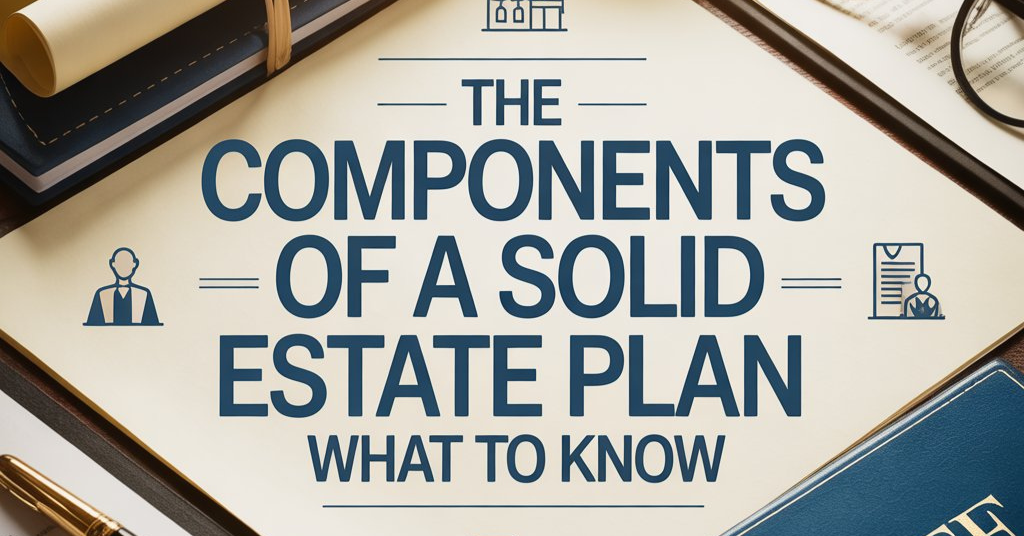Estate planning isn’t just for the wealthy—it’s for anyone in Australia who owns assets, has dependents, or wants control over what happens if they pass away or become incapacitated. A well-designed estate plan ensures your property, healthcare wishes, family, and finances are managed according to your intentions—not left to courts, government rules, or family disputes.
This guide breaks down every major the components of a solid estate plan what to know, explains how each part works, includes examples and basic calculations, and makes it easy to understand—even if you’re not a legal or finance expert.
✅ Why Estate Planning Matters in Australia
Many Australians delay or ignore estate planning, thinking it only applies to the wealthy or elderly. But consider these realities:
- Superannuation and insurance payouts can total hundreds of thousands of dollars.
- Property values have risen, even for average households.
- If you die without a will (intestate), each state has default rules that may not match your wishes.
- Without enduring powers, family may need to go to court to gain authority over medical or financial decisions.
- Probate can delay access to assets for months or even years.
A proper estate plan helps:
✔ Protect your beneficiaries
✔ Avoid unnecessary tax or legal costs
✔ Choose who controls your finances and healthcare
✔ Prevent family disputes
✔ Speed up asset transfers after death
✔ Plan for incapacity, not only death
✅ The Components of a Solid Estate Plan What to Know
A complete estate plan in Australia typically includes:
- A Valid Will
- Testamentary Trusts (Where Needed)
- Enduring Power of Attorney (Financial & Legal)
- Advance Care Directive / Medical Power of Attorney
- Superannuation & Beneficiary Nominations
- Reviews, Digital Assets & Supporting Documents
Let’s break down each in detail.
1. A Valid Will (The Foundation of Every Plan)
A will outlines how your assets are distributed when you die and who is responsible for managing your estate (the executor).
✅ What an Australian Will Should Include
- Appointment of executor(s)
- Detailed asset distribution
- Guardians for minor children
- Instructions for personal belongings
- Direction of debts and liabilities
- Backup or substitute beneficiaries
✅ What Happens Without One?
Each state has intestacy laws:
- NSW – Succession Act 2006
- Victoria – Administration and Probate Act 1958
- Queensland – Succession Act 1981
- Other states follow similar structures
These laws decide who gets what, often prioritising spouses and children. But it can still lead to disputes or unintended outcomes.
✅ Example
Emma (Perth) passes away with:
- $850,000 home (joint with spouse)
- $200,000 savings
- $90,000 super (binding nomination to husband)
Without a will:
- Husband inherits the estate by WA intestacy rules
- No guardian nominated for children
- Super goes to spouse (since nominated)
- No plan for minor children’s future funds
With a will:
Emma could direct funds to children, nominate guardians, or set up a trust.
2. Testamentary Trusts (Flexible Asset Control After Death)
A testamentary trust is created within your will and activates after death. It is especially useful if you have minor children, blended families, high-value assets, or beneficiaries with disabilities.
✅ Benefits
✔ Tax advantages
✔ Protection from divorce claims or creditors
✔ Flexible payouts
✔ Asset control for minors
✔ Useful for family businesses
✅ Example with Tax Savings
Lisa leaves $600,000 to her two children (aged 10 and 14).
Option 1: No trust
Money is held by a guardian and taxed at adult rates (or higher penalty rates for minors without trust protection).
Option 2: Testamentary Trust
Each child can receive income taxed as an adult (even if under 18). In Australia, minors normally pay high tax, but income from testamentary trusts is treated differently.
Basic tax comparison:
- Without trust: $10,000 income taxed at up to 45%
- With trust: First $18,200 tax-free (per child based on adult tax rates)
Over time, this can save tens of thousands for a family.
3. Enduring Power of Attorney (Financial & Legal Control)
A standard Power of Attorney may stop if you lose mental capacity—but an Enduring Power of Attorney (EPOA) continues to apply.
✅ What It Covers
Depending on your state, the EPOA can manage:
- Banking and bills
- Property sales/transfers
- Investments
- Super access if permitted
- Business management
- Debt settlement
- Legal decisions
✅ State naming differences
- NSW & ACT: Enduring Power of Attorney
- VIC: Enduring Power of Attorney (Financial/Personal)
- QLD: Enduring Power of Attorney
✅ Example
Mark suffers a stroke and can’t sign paperwork. With an EPOA:
- His spouse can sell an investment property to cover aged care costs
- She can access joint bank accounts legally
- She avoids applying to the court for guardianship
Without EPOA:
- A family member must apply to a tribunal (e.g., VCAT, NCAT, QCAT)
- This takes months and costs money
- Financial decisions may be delayed or denied
4. Advance Care Directive / Medical Power of Attorney
Health planning is a vital part of estate planning. Each Australian state uses different legal terms.
✅ State Variations
| State / Territory | Document Name |
| NSW | Enduring Guardian Appointment |
| VIC | Medical Treatment Decision Maker + ACD |
| QLD | Advance Health Directive + EPOA |
| SA | Advance Care Directive |
| WA | Enduring Power of Guardianship |
| TAS | Enduring Guardianship |
| ACT | Health Direction + EPOA |
| NT | Advance Personal Plan |
✅ What It Can Cover
- Life support preferences
- Palliative care wishes
- Surgery approvals
- Organ donation decisions
- End-of-life treatment
- Who speaks for you if unconscious
✅ Example
Sarah (69, Brisbane) prepares:
- An Advance Health Directive rejecting mechanical ventilation
- An Enduring Power of Attorney for health decisions
Her family avoids court involvement and respects her treatment choices legally.
5. Superannuation & Beneficiary Nominations
Super does not automatically form part of your will. Your fund trustee decides who receives your balance unless you’ve completed a binding nomination.
There are two main types:
- Binding Death Benefit Nomination (BDBN) – legally enforceable (usually valid 3 years unless non-lapsing)
- Non-binding Nomination – guidance only
✅ Who You Can Nominate
- Spouse or de facto partner
- Children (including adult and step-children)
- Someone financially dependent on you
- Your legal personal representative (estate)
✅ Example With Numbers
John dies with:
- $220,000 in super
- Binding nomination to his three children equally
Each child receives:
$220,000 ÷ 3 = $73,333
If one child is under 18 and still dependent, their share may be tax-free. Adult, non-dependent children may pay tax of up to 15% or 30% on the taxable portion.
Without a nomination:
The fund could:
- Pay the entire balance to his estate (adding delay), OR
- Choose a dependent beneficiary on its own discretion
6. Reviews, Digital Assets & Supporting Documents
Estate planning is not “set and forget.” Reviews should occur:
- Every 3–5 years
- After major life events (marriage, divorce, children, relocation, property purchase)
- If laws change
- When finances grow or shrink significantly
✅ Don’t Forget
✔ Digital assets (email, crypto, social media)
✔ Funeral & burial instructions
✔ Letters of wishes
✔ Guardianship planning
✔ Life insurance policies
✔ Business succession plans
✅ Example: Full Estate Plan Scenario
Case Study: The Taylor Family (Victoria)
Assets:
- Family home: $900,000
- Investment unit: $450,000
- Superannuation: $380,000
- Savings: $85,000
- Business: $300,000
- Life Insurance: $600,000
Couple aged 52 with 2 kids (15 and 19).
Estate Plan Setup
- Will
- Leaves the family home to spouse
- Sets up testamentary trust for children
- Appoints spouse as executor, daughter as substitute
- Testamentary Trust
- Created for both kids
- Income taxed at adult rates (big tax benefit)
- Funded by $450,000 investment property income and business sale later
- Enduring Power of Attorney
- Covers financial & legal powers
- Successor is sibling if spouse is incapacitated
- Advance Care Directive
- States no prolonged life support
- Daughter named as medical decision maker
- Super & Insurance Nominations
- Binding nominations: 50% spouse, 50% to testamentary trust
- Insurance paid into estate and distributed via trust
- Review Schedule
- Planned check every 3 years
- Accountant ensures asset structuring and tax efficiency
In the event of illness or death, the family avoids court processes, protects assets for minors, and reduces taxes.
✅ Common Mistakes to Avoid in Australia
❌ Dying without a valid will
❌ Not updating superannuation nominations
❌ Assuming assets will “automatically” go to a spouse
❌ Leaving minor children as direct beneficiaries
❌ Not funding a trust after creating it
❌ Letting documents expire or stay unsigned
❌ Ignoring digital assets
❌ No backup executors/guardians
❌ Forgetting blended family complexities
✅ Who Should Consider an Estate Plan?
You need an estate plan if you:
✔ Own property
✔ Have children or dependents
✔ Have superannuation
✔ Want to choose medical decision-makers
✔ Run a business or family trust
✔ Are married, de facto, divorced, or separated
✔ Want to minimise disputes or tax
✔ Have life insurance
✔ Want control over aged care or incapacity phases
Even a 25-year-old with super and a car loan benefits from powers of attorney and nominations.
Also Read: 6 Top Reasons Why Youll Want to Invest in Financial Planning
✅ Final Thoughts
A solid estate plan in Australia is made up of more than a will. It combines legal, financial, medical, and personal instructions so:
- Your money and assets go to the right people
- Your medical and care preferences are honoured
- Your dependents are protected
- Taxes and delays are reduced
- Family conflict is minimised
Whether you’re a young professional, property owner, parent, retiree, or business owner, these six components can give you control and peace of mind.










